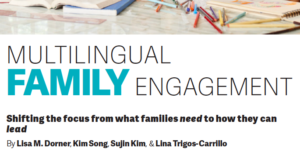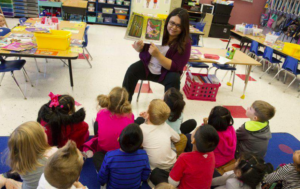
Migration. Whether searching for greater opportunities or enriching experiences, or escaping poverty or war, people are on the move. Worldwide, the United Nations reports that more than 250 million people do not live in the country where they were born, an increase of 49% since 2000. In the United States, the percentage of children who have at least one immigrant parent or caregiver grew from 18% to 27% between 1997 and 2017. More than 20% of households speak a language other than English. Some schools that have never served students who speak other languages now have to design English language development or bilingual education programs. (Dorner, Song, Kim, & Trigos-Carrillo, 2019)
In this recent article published in Literacy Today, colleagues and I reflected on how schools manage this kind of change, especially: How do they integrate, support, and reach out to immigrant, multilingual families? Research has long suggested that traditional family engagement in schools fails to incorporate diverse communities in meaningful and empowering ways. This contributes to ongoing marginalization based on race, ethnicity, class, language, and immigrant status. In our work with various school districts, we encourage educators to shift their thinking from what families might need to how they, themselves, can lead. In the article, we provide examples of how to host literacy days in families’ languages, what we learned, and how to work with parents as partners in developing school-wide events.
We conclude: Too often, schools view home languages and cultures as deficits, with families merely receiving information and services. If families and classroom teachers are at the center of family engagement, they will be leaders and agents, and together we can transform our English-only and monolingual spaces to multilingual, culturally sustaining ones.
This article originally appeared in the November/December 2019 issue of Literacy Today, the member magazine of the International Literacy Association.



